Avoiding Financial And Governance Disasters
A Speech to the Restore Conference – Judson University
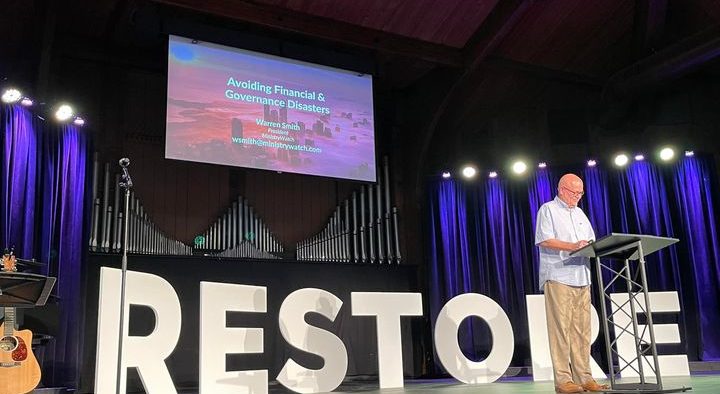
Editor’s Note: MinistryWatch President Warren Smith delivered the following address to the Restore Conference held at Judson University on May 20-21, 2022.
When it comes to scandals in the church, nothing generates headlines like a sex scandal.
Bill Hybels and Willow Creek. Bill Gothard. Ravi Zacharias International Ministries. Jerry Falwell Jr. and Liberty University. Brian Houston, Carl Lentz, and Hillsong. Kanakuk Ministries. The Southern Baptist Convention.
If you want to generate a headline, an accusation of sexual abuse will do it.
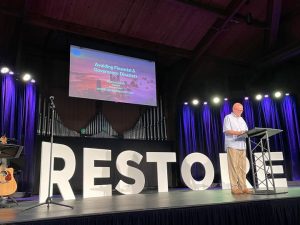
In fact, based on the line-up of speakers here this weekend at the Restore Conference, I would hazard a guess that concern about sexual abuse and sexual harassment energizes many of you, too.
If that’s why you are here, I want to affirm your concern. Sexual harassment and sexual abuse are horrible, and we should stand against these behaviors. I know some of you are survivors, and others of you are survivor advocates. I applaud your courage and your efforts.
I share this affirmation here at the beginning so you will not think I want to diminish the importance of your efforts when I say that in some very important ways, sexual abuse and sexual harassment in the church are effects. They are consequences. They are fruits, not the root, of the problem.
So what’s the cause?
It’s pretty un-glamorous. It doesn’t generate as many headlines, and when it does generate a headline, that headline tends to be ignored, or quickly forgotten.
And that cause is money. More specifically, the love of money.
On the one hand, this assertion is probably not surprising. SEX, MONEY, and POWER are sometimes called “The Devil’s Triangle.” The Bible – in I John 2:16 – refers to this triad as “the lust of the flesh,” (sex) “the lust of the eyes” (covetousness or acquisitiveness – in other words: money), or the “pride of life” (power).
So, at a minimum, I think we evangelicals should be spending as much time understanding and uncovering financial fraud as we spend on sexual abuse and toxic leadership.
But there’s another reason: The Bible says that the “love of money is the root of all sorts of evil.” Many of the sins we see in the church find their root in a love for money. And I’m not talking about – or MERELY talking about – the love of money we see in the Prosperity Gospel. The Prosperity Gospel is a scourge on evangelicalism, to be sure. Prosperity Gospel preachers such as Benny Hinn, Kenneth Copeland, Creflo Dollar, Paula White, and others are perverting the Gospel in obvious ways.

But my guess is that most of you in this room see that perversion for yourself.
So today I will not be dissecting the Prosperity Gospel, though that is a worthy project. Rather, I am more concerned today with unpacking some of the sex scandals that have been in the news and helping us understand that the root cause of these scandals is not sex at all, but power and money.
Specifically, in all the cases above — Bill Hybels and Willow Creek, Bill Gothard, Ravi Zacharias International Ministries, Jerry Falwell Jr., and Liberty University, Brian Houston and Carl Lentz and Hillsong, Kanakuk Ministries, The Southern Baptist Convention – the common pathology was not sexual misconduct, even though sexual misconduct was certainly the presenting symptom in all three of these cases.
No, the common pathology was a lack of TRANSPARENCY and ACCOUNTABILITY.
Once again, I should admit that these are unglamorous ideas to discuss, but I hope you will soon see why these issues should be of vital importance to Christians, especially those of us who care about the peace, purity, and unity of the Church of Jesus Christ.
Transparency and Accountability
So, with that context, let me say plainly: Transparency and accountability are the instruments of truth-seeking and truth-telling.
Transparency and accountability are the two essential, non-negotiable ingredients when it comes to the restoration of the evangelical church.
These two words – transparency and accountability — can and do mean a lot of things. On the purely tactical and practical level, they mean that Christian non-profits should release their Form 990s to the public.
There is a trend among Christian ministries to claim to be churches in order to receive an exemption from that requirement.
This practice is not new. Controversial and sometimes outright fraudulent organizations have been claiming the church exemption for years. It’s a common practice of televangelists and prosperity gospel preachers. 
From 2008 to 2011, Sen. Charles Grassley investigated six televangelists – Benny Hinn, Eddie Long, Joyce Meyer, Kenneth Copeland, Creflo Dollar, and Paula White-Cain. The investigation was necessary in part because their organizations were not transparent in their dealings. The organizations they led spent donor money on mansions, lavish lifestyles, and private jets.
Now, though, other organizations are following the terrible example of these prosperity gospel preachers. Some of these organizations are those I would have told you five years ago were exemplars, ministries the set the standard, that were above reproach.
Alas, I can no longer say that is true for organizations who now hide behind the church exemption as an excuse for a lack of transparency. Among the organizations who now claim the church exemption are: Cru (formerly Campus Crusade for Christ), The Navigators, the Billy Graham Evangelistic Association, the Willow Creek Association, Gideons International, Ethnos 360/New Tribes Mission, Precept Ministries, Denison Ministries, Voice of the Martyrs, Missio Nexus, and the now defunct Ravi Zacharias International Ministries.
Many of these organizations have made this change in the past five years. At least two of these organizations (Willow Creek and RZIM) had major scandals in recent years. Indeed, RZIM is no longer in business.
I have so far heard of no scandals at the Billy Graham Evangelistic Association, Cru, and the others. But let me repeat: Evil thrives in darkness. My recommendation to these organizations and others considering the church exemption: Walk in the light as He is in the light.
Ravi Zacharias International Ministries
To make that point even more explicitly, I think it’s important to pause on the RZIM case for minute. We think of it as a sexual abuse case. We now know the stories of Lori Anne Thompson and the spa workers Ravi Zacharias abused.
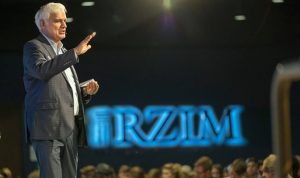
But I assert that the seeds of that toxic tree were planted in 2014, when RZIM stopped filing its Form 990s with the Internal Revenue Service. When that happened, we stopped knowing who was on the organization’s board of directors. We stopped knowing how many members of the Zacharias family were in key leadership positions. We stopped knowing how much money RZIM spent on activities – such as travel for Ravi himself, and legal fees – that might have revealed problems long before they became fatal.
Let me say again: Evil thrives in darkness. Sunlight is the best disinfectant. It should therefore come as no surprise whatsoever that when RZIM chose to conceal its financial information from the public in 2014, scandal quickly followed, and less than a decade later that scandal proved fatal to the ministry.
Board Governance
These words – transparency and accountability – also mean that board members should be independent. They should not have financial or familial arrangements with the organization they are governing. This lack of independence is a flaw we saw at Mars Hill, at Kanakuk, and elsewhere.
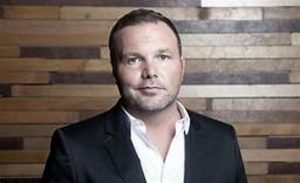
And to make this point, I want to pause again for an example. That example is Mars Hill Church. I did a lot of the reporting that ultimately resulted in Mark Driscoll leaving Mars Hill Church and that church ultimately dissolving. I saw, years before Mark Driscoll’s departure and the implosion of the church, that one of the early warning signs at Mars Hill was a lack of independent board members.
The number of elders there floated around a bit during the life of the church, but there were about 35 elders when I was doing my reporting, and of those 35, more than 30 of them were on the payroll.
That meant they had a direct financial conflict of interest. Their duty as elders to hold Mark Driscoll accountable conflicted directly with their role as employees – employees that Mark Driscoll could fire if he didn’t like the messages they were bringing to him.
I should also mention that even if all of Mars Hill Church’s elders had been independent, the board would still have been too large. Having a board that is too large is as bad as having a board that is too small. Large boards make it difficult for individual board members to speak out. Dissident board members have a hard time making themselves heard, and have an even harder time mustering the support they might need from other board members to affect change.
This was a big part of the problem at Liberty University. The salacious headlines related to Jerry Falwell Jr. disguised the fact that the real problems were on the board.
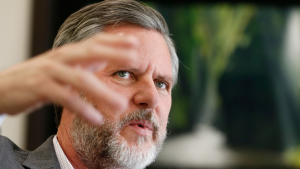
Liberty’s board is too big. It has 33 members, and in the recent past it has had as many as 41 members, much too large for efficient decision-making, or for dissenting voices to be appropriately heard.
Opinions vary about the optimal board size. According to the Corporate Library’s study, the average board size is 9.2 members (in for-profit organizations). Some analysts think the ideal size is seven. At MinistryWatch, we recommend that ministries have a board with 7 to 11 members.
Secondly, Liberty’s board is, for the most part, what is sometimes called a “pay to play” board. It is made up mostly of either big donors, or Christian celebrities, or pastors of big churches who have the ability to use their platforms as “bully pulpits” for Liberty – using their influence to recruit students to attend and alumni and donors to give. The fact that Liberty’s board is a large board makes the board meetings a networking opportunity. Large, pay-to-play boards often benefit the individual board members and their platforms as much as they benefit the organization on whose board they are serving.
Most non-profit boards exhibit some degree of this “pay to play” phenomenon, and it’s not always a bad thing. Big donors (and “opinion influencers” such as pastors) can also be people who care enough about the institution to make big commitments, even sacrifices. They invest their dollars, their time, and their reputations.
But boards, especially boards of large and complex organizations such as Liberty do – or are supposed to do – real work. Sometimes that work is complicated, technical, time-consuming. It requires real professional expertise, not people who will merely rubber-stamp staff recommendations.
I’m sure the vast majority of Liberty University’s board members are well-meaning people, who care about the school. But being an effective board member for a $750-million enterprise requires much, much more than good intentions. The bottom line here is hard to say, especially hard for me because I know some of the board members and they are good people. But it must be said: The failure of Liberty University was not just a failure of Jerry Falwell, Jr., it was also a failure of the Board of Trustees.
Liberty University’s trustees failed the school’s students, faculty, administration, and parents. They failed donors and alumni. They failed to hold the one member of the Liberty staff that reports to them to the Biblical standards of leadership, or even to the standards that every member of the Liberty community must live up to.
If Liberty is to experience true healing and a positive path forward, Jerry Falwell, Jr., should not be the only person who departs. All, or a substantial number of, Liberty’s board members should follow him into retirement.
(Editor’s Note: To read more about Liberty and its board, click here.)
Access to MinistryWatch content is free. However, we hope you will support our work with your prayers and financial gifts. To make a donation, click here.
American Bible Society
For those who think these kinds of issue are not solvable, or too esoteric, or just plain boring, or those of you who might be getting discouraged by all the negative examples, let me offer a positive one: The American Bible Society.
The American Bible Society (ABS) is one of American Christianity’s grand old institutions. Founded in 1816, it has helped finance hundreds of Bible translations and has a 45,000-volume collection of Bibles, the largest outside the Vatican.
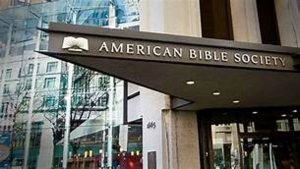
But in the early 2000s, the American Bible Society ran into a number of difficulties. I will not recount them here. If you’re interested, I did an article for WORLD on the ABS around 2014 which itemized their problems.
The key point I want to make here is that during the era of the troubles, the ABS had 72 board members. The board was far too large and badly misaligned with the historic mission of the organization.
In my view, the American Bible Society still has issues. For example, it has an endowment of $750-million – three-quarters of a billion dollars. In my view, in an era with so many urgent ministry needs, for a Christian ministry hoard that much money, and not deploy it in ministry activities is unbiblical and (arguably) immoral.
That said, the organization has come a long way. It now has about 20 board members. Still too large, but a huge reduction from its high of 72. The organization also has had more stable leadership and a clearer focus in recent years. It has not arrived at the destination yet, but it is definitely moving in the right direction.
Journalism’s Unique, Indispensable Role
I would like to close my talk today with some practical and realistic suggestions for avoiding the kinds of governance and financial disasters I’ve been talking about. But before I do that, I hope you will indulge me a bit of a side trip to discuss the indispensable role journalism and whistleblowers play in exposing evil and helping to enhance transparency and accountability.
Said plainly: In a fallen world, with so many financial incentives to do the wrong thing, disincentives to do the right thing, it is foolish to expect ministries to police themselves. The temptation is just too strong to look the other way when wrongdoing and irregularities occur, and the bigger and more powerful the institutions become, the greater the temptation to keep quiet becomes.
We can’t count on the Evangelical Council for Financial Accountability. The ECFA does good work, but it is not a watchdog organization. The membership is too small, and members pay dues. That means it is not in the ECFA’s financial interest to police its members.
In fact, in every case I have mentioned today, neither the government, nor the Evangelical Council for Financial Accountability, nor denominations, nor the boards of these ministries have brought those stories into the open.
Indeed, these institutions were either absent or impotent. In some cases – such as at Mars Hill Church, Willow Creek, and Ravi Zacharias International Ministries, the boards were – arguably — complicit in the wrongdoing. RZIM was a member of the ECFA the entire time it was engaged in wrongdoing.
Instead, Christian journalists played a key role in each of these stories. Journalism ended up being vital, essential, in part because one of the pathologies of the evangelical church today is that it is no longer able to police itself with anything resembling biblical structures of church polity.
(I have much more to say on this matter, and – at the risk of shameless self-promotion – let me mention that I recently did a speech to the national meeting of the Evangelical Press Association titled “How Journalism Can Save Evangelicalism.” If you want to dig more deeply into this issue, I commend that speech to you, which you can hear and read on the MinistryWatch website.)
But let me also say that we journalists can’t do our job without whistleblowers, without courageous people who stand up and step up with their stories. I know some of you are in the audience today. We will be hearing from some of you this weekend. Some of you are here because you have stories you’ve never told, and you think that being here might help you learn how, or to whom, to tell your stories.
To all of you, I want to first say: THANK YOU and God bless you. We hear you. We believe you.
But…
As a journalist, it is my job to do more than merely believe you. I have to tell the truth in ways that are credible to my readers. That means I need to ask you hard questions. The hard questions don’t mean I don’t believe you. But they are questions I need to ask in order to tell a story more truthfully, more credibly.
Some Practical Recommendations
And that brings me to my conclusion. I’d like to end with some practical suggestions that you can follow whether you are a ministry leader, a pastor, a journalist, survivor of sexual or financial abuse.
The first suggestion I have is this:
- Get a copy of MinistryWatch’s “75 Red Flags” document. It’s absolutely free and on our website.
- Get a copy of the financial statements of ANY organization you give money to. No exceptions. Even if you have no idea how to read a financial statement, ask for it anyway. You will learn a lot about an organization just by their response to this request.
- Do not give money to a ministry that does not release its Form 990 to the public.
- Check The MinistryWatch 1000 database. We have financial information and ratings for the 1000 largest Christian ministries in the country. (Editor’s Note: To go to the database, click here.)
- Check the Donor Confidence Score. DO NOT give to a ministry that has a “Withhold Giving” Donor Confidence Score. In our system you have to be doing a lot of things wrong to get a “Withhold Giving” score, so please don’t give money to a ministry with a “Withhold Giving” Donor Confidence Score.
- Look for an independent board of between 7 and 11 board members. Is that a “magic number”? No, but we have found that having either too many board members, or too few, is a problem. An independent board member is one with no financial or relational conflicts of interest. Not an employee, a contractor, or a family member.
- Give to Christian organizations that have a clear and biblical statement of faith. A recent survey by Grey Matter Media found that the favorite ministries of evangelical Christians are often not Christian ministries, and in some cases – such as UNICEF – are organizations that are in opposition to Christian ideals.
- Expose evil deeds of darkness. If you see something, say something. My email address is [email protected]
- Don’t make exceptions. This may be the advice that is the hardest to follow. But don’t forget that your financial support is your leverage. If you are going to give to a ministry even if they violate the rules, then you may as well not have rules. Don’t say, “Well, I know that Ravi Zacharias doesn’t release his Form 990s to the public, but…well…come on…. It’s RAVI ZACHARIAS! My response to that is, “Exactly.”
Conclusion—Loving Well In A Beautiful But Broken World
In closing, I have one more thought I’d like to leave with you.
We live in a broken world. Most evangelical Christians know that. We know we need Jesus to save us from that brokenness, from sin, from death, from hell. These ideas have been drilled into us if we have been raised in the evangelical world. And, by the way, these ideas are true.
But they are not the whole truth. They tell us what we have been saved from, but not what we are saved for.
Scripture tells us that we have been reconciled in order to be reconcilers. We have a ministry of reconciliation. We are participating with God in the repairing, the restoration, of His beautiful but broken world.
One of the ways we do that is to tell the truth. The truth always sets us free. It never doesn’t set us free. Telling the truth is an act of love. That’s why we ask hard questions. That’s why we speak up.
Because telling the truth is an act of love.
It is my prayer that something I have said today will help you to love well in this beautiful but broken world.



